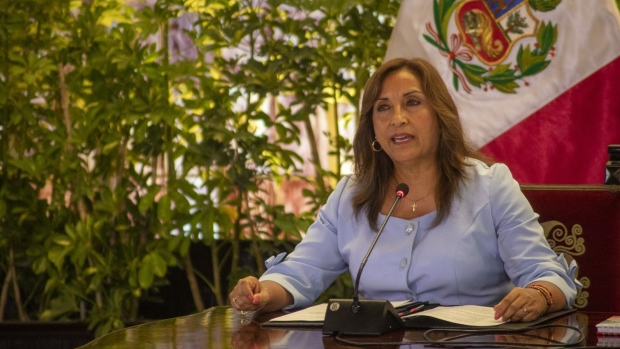May 25, 2023
Peru’s President Bears Some Blame for Protester Deaths, Amnesty International Says
, Bloomberg News

(Bloomberg) -- Peruvian President Dina Boluarte bears some of the blame for the deaths of dozens of protesters killed by security forces, Amnesty International said.
“She cannot run away from her responsibilities for the bloodshed,” Amnesty’s Secretary General Agnes Callamard told Bloomberg in an interview in Lima after the organization published a new report on the violence.
Boluarte failed to prevent the police and the army from killing protesters between December and February, the report found, as Peru suffered its worst bout of social unrest in decades. Boluarte came to office in December after her predecessor was impeached, in events which triggered mass disorder and highway blockades that paralyzed the economy.
As soon as she took over, she faced protests demanding her resignation, which lead to almost 50 civilian deaths in clashes with security forces.
Those deaths spanned a period of two months, with two significant protests ending in the deaths of eight in the city of Ayacucho on Dec. 15 and 17 in the city of Juliaca on Jan. 9.
Homicide Investigation
Nobody has been yet been charged for the deaths, though Boluarte herself is facing a homicide investigation.
“That she should be investigated for homicide is absolutely logical,” Callamard said.
Boluarte denies any responsibility, saying that if the police or military carried out abuses it was on their own, because she does not control their operations. She has previously congratulated security forces for their handling of the protests.
Read More: Peru’s Boluarte Seeks Distance From Response to Protests
The killings “took place over a period of time, in other words (Boluarte) had the information that she could have used to demand a different response to the protests and she did not,” Callamard said. “So a responsibility is involved either because she failed to take action to prevent the repeated violence... or because she herself ordered that level of repression.”
“The fact that they were extrajudicial executions, I think we are able to prove that fairly conclusively,” Callamard added.
The organization’s conclusions are stronger than previous reports from Human Rights Watch and the Inter-American Commission on Human Rights, which found that Peru had “likely” carried out extrajudicial executions in their handling of the protesters.
©2023 Bloomberg L.P.